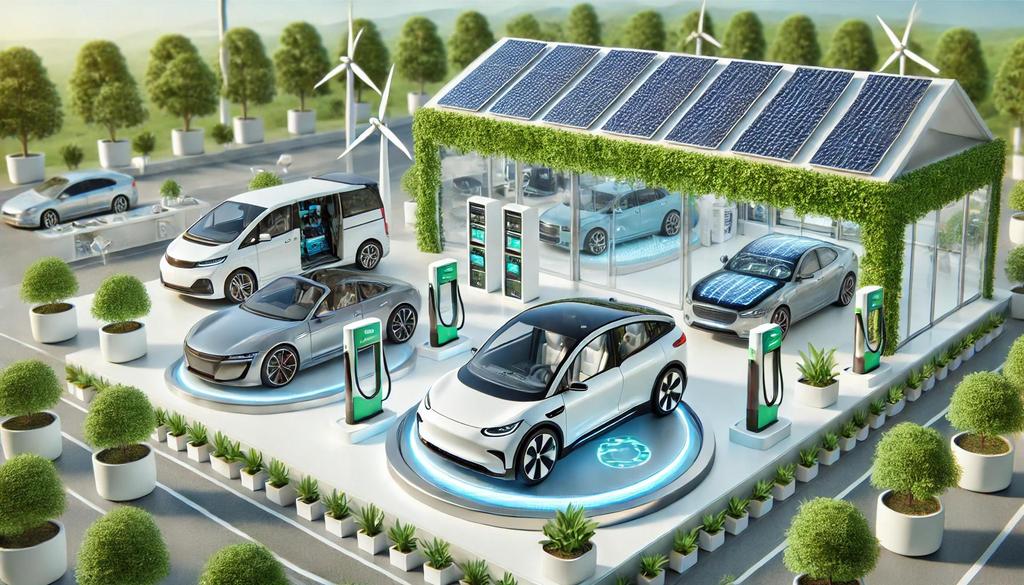The global conversation around sustainability has significantly shaped various sectors, including the automotive industry. This focus has ushered in a critical transformation towards sustainable auto technology, a trend reshaping how vehicles are designed, manufactured, and used. As climate change escalates, there’s a pressing need for the auto industry to innovate in ways that decrease environmental impact while maintaining performance and affordability.
Introduction to Sustainable Auto Technology
Car manufacturers are continually researching and developing advanced technologies to meet these needs. This includes everything from enhancing fuel efficiency to reducing emissions and finding new materials that improve the environmental footprint of their vehicles. For many, visiting car dealerships in Lakeland, FL, signifies an exploration of these new, sustainable innovations that aim to blend ecological consciousness with modern vehicle performance.
Green initiatives, such as installing energy-efficient systems and harnessing solar energy, are the main focus of sustainable auto dealerships in Lakeland, Florida. Many of these dealerships of new cars for sale in Tampa prioritize electric and hybrid vehicles, helping to reduce emissions and promote greener transportation options. Engaging in community initiatives and recycling programs contributes to a more sustainable local economy while educating customers about eco-conscious choices.

Types of Sustainable Auto Technologies
Sustainable auto technology is diverse, encompassing various innovations. Arguably, the most prominent are electric vehicles (EVs) and hybrids, which have gained significant traction in recent years. EVs operate on electric power alone, offering zero emissions, while hybrid models use a combination of electric motors and conventional engines to optimize fuel use. This hybrid approach provides a bridge for consumers transitioning from traditional fuel to electric power, promoting wider adoption.
Beyond electrification, hydrogen fuel cells stand out as a viable, sustainable solution, producing only water vapor as waste. Though still in the development and early adoption stages, hydrogen technology promises a future where cars are powerful and pollution-free. Furthermore, incorporating solar panels and other renewable energy sources into cars opens up intriguing new possibilities, such as self-sufficient energy sources for backup power systems.
Benefits of Embracing Sustainable Auto Solutions
The benefits of adopting sustainable auto technologies extend beyond individual gain to encompass broader environmental and economic advantages. Primarily, these innovations play a vital role in reducing the carbon emissions and pollutants that exacerbate global warming. Choosing greener mobility choices as a society reduces greenhouse gas emissions, improves air quality, and enhances community well-being.
Economically, the transition to sustainable vehicles can lead to long-term cost efficiencies. In particular, electric vehicles can significantly reduce fuel expenses while minimizing maintenance costs due to fewer moving parts. These reduced costs are proving enticing for consumers and businesses alike. Moreover, by promoting sustainable auto solutions, the industry is proactively creating jobs in emerging sectors, such as renewable energy and electric vehicle infrastructure, ultimately benefiting the broader economy.

Challenges in Implementing Sustainable Technologies
Transitioning to sustainable auto technologies is not without its challenges. One of the significant barriers is infrastructure, especially regarding electric vehicles. For EV adoption to flourish, a wide-reaching, efficient network of charging stations is imperative. Currently, the absence of a robust infrastructure can deter potential buyers concerned about long-distance travel and recharging convenience.
Economic challenges also exist as industries pivot towards sustainable production processes. This shift necessitates the retraining of a workforce skilled in traditional auto manufacturing. The reliance on vital raw resources such as lithium, cobalt, and rare earth elements—all crucial components of electric batteries—raises additional concerns over resource shortages and ethical mining practices across the globe.
Recent Innovations and Developments
The automotive industry’s dedication to innovation is evident through numerous breakthroughs in sustainable technology. Advances in battery technology, such as solid-state batteries, promise higher energy density, faster charging, and enhanced safety for electric vehicles. These developments are fueling discussions around the feasibility of long-range electric vehicles and their practical implications.
Collaborations between automakers and tech innovators are at the forefront of these advancements. Projects include experimenting with renewable materials, autonomously driving electric cars, and even integrating artificial intelligence to optimize energy efficiency. For more information on the latest auto industry innovations, you can explore what industry leaders are implementing to drive change.
The Role of Consumers in Driving Change
Consumer behavior has a profound impact on the progression and adoption of sustainable technologies. Demand for eco-friendly vehicles is crucial in pushing manufacturers to innovate and invest in green technologies. Moreover, as awareness grows, more consumers are making informed choices, prioritizing sustainability in their purchasing decisions.
Educational initiatives and accessible information about sustainable options empower consumers to make choices that align with global sustainability goals. By supporting brands and products focusing on reducing environmental impact, consumers can influence the market and inspire manufacturers to expand their sustainable offerings.

Future Predictions for the Automotive Industry
Looking ahead, the automotive industry’s trajectory indicates a significant shift towards further integrating sustainable technologies. Key trends include the rise of autonomous vehicles, which are likely to be electric as well, offering a dual benefit of reduced emissions and enhanced mobility solutions. Shared mobility services are also expected to grow, presenting sustainable and cost-effective transportation options.
Global policies and commitments to climate action will further accelerate the industry’s transformation. These frameworks set ambitious targets, encouraging innovation and adoption of sustainable practices. For insights into future auto trends, exploring these developments can offer valuable perspectives on the changes to expect in the coming decades.
Innovations in Sustainable Automotive Technology for a Greener Planet
The journey towards sustainable auto technology is not merely a trend but a necessary evolution for the industry’s future and the planet. Emphasizing innovations that reduce environmental impact while providing practical transportation solutions highlights the industry’s commitment to sustainability. Continued investments in research, consumer engagement, and global collaboration are vital to realizing a future where vehicles are efficient and environmentally harmonious.
